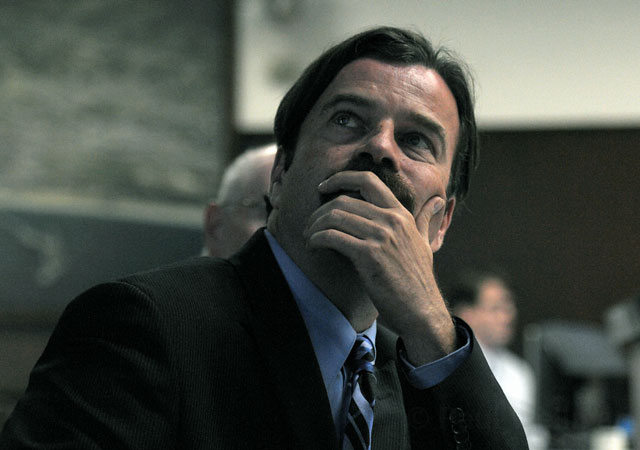Diary of a Wimpy Dog
Poodle Chases His Tail as City Council Deliberates the Fate of the City’s Oldest Pot Shop, The Compassion Center

COMPASSION NOT SERVED HERE: Sometimes I really wish I smoked pot. Tuesday night was one such occasion. Maybe some high-grade product was required to follow the circular reasoning and snake-eating-its-tail logic that propelled the City Council’s deliberations over Santa Barbara’s oldest pot shop — The Compassion Center on upper De la Vina Street. In any case, the punch line is that after 11 years in business, the Compassion Center is toast. I’d say it got blindsided, sucker-punched, tossed under the bus, and fed to the fishes. It’s true the center’s owner — the cranially kinetic Patrick Fourmy — hurt his cause more often than he helped it. But for S.B., it’s a significant loss. In the smarmy, nudge-nudge-wink-wink legal twilight zone of medical marijuana, the Compassion Center was a straight-up operation that kept its head down and, for the most part, its nose clean. Since 2001, there hasn’t been a complaint or problem other than a robbery last October. To a ridiculous degree, the center managed to get along famously with neighbors, seven of which submitted gushing testimonials. There are no nearby schoolkids for the center to imperil, and better yet, it’s situated spitting distance from Cottage Hospital — exactly where a medical pot shop should be. It’s drawn rave reviews from a host of medical professionals with superstar credentials — not just pot docs who write up $99 prescriptions. Most notably, Dr. Steve Hosea, Cottage’s Director of Clinical Care, who conspicuously does not sport dreadlocks or adorn his waiting room walls with Bob Marley posters, praised Fourmy for running a safe haven that’s comfortable for older patients in the throes of life-threatening medical trauma. Many of these people, he noted, are initially reluctant to even consider medical marijuana — let alone try it — and simply could not deal with the trendier hipster emporiums where it’s mandatory for employees to sport cored-out earlobes.

Going into Tuesday’s council meeting, Fourmy didn’t have a prayer. He’d previously been shot down by the Planning Commission, and before that by the city’s hearing examiner. He was asking the council to reverse those decisions and issue him one of the three pot-shop permits allowed under the city’s new dispensary ordinance passed last June. It didn’t help that four of the seven councilmembers would prefer to ban dispensaries completely. Even worse, City Attorney Steve Wiley was leading the attack. For the past six months, Wiley has argued that Fourmy has been running an “illegal operation” because he ceased doing business for 30 days or more back in 2008 (more on why this is important later). But this claim is based on evidence that strikes even Fourmy’s harshest critics as decidedly flimsy. Even so, it effectively killed the center’s permit application every step of the way. On Tuesday night, Fourmy presented evidence and testimony — admittedly way late and many dollars short — that, if accurate, rebutted the factual foundation of Wiley’s argument. But Wiley remained unfazed. He countered that it had become legally irrelevant whether those “facts” were true. Under the terms of the city’s new pot law, Wiley argued, Fourmy had until January 29 to secure a legal permit. Because he failed to do so, Wiley continued, Fourmy was legally required to shut down. That Fourmy remained open, he said, is a clear violation of the city’s pot-shop law. And that, he concluded, was ample cause for the council to reject Fourmy’s appeal. I still haven’t recovered from the whiplash that induced. For a while I thought I was trapped in an M.C. Escher painting. To his credit, Councilmember Grant House tried to grapple with the concentric circularity of Wiley’s argument, but only got a stiff neck for his efforts. Were it not for Wiley’s initial assertions of these questionable facts, House suggested, Fourmy would have gotten all the necessary permits by last December. If that had happened, House continued, Fourmy never would have run afoul of the January 29 deadline. And then, he concluded, the council could give approval.
The 30-days issue matters because Wiley decreed years ago that any pot shop operating under the city’s previous legal guidelines that went out of business for 30 days or more had forfeited its status as a “legal nonconforming” operation. Up to then, that’s how the Compassion Center had been designated. In 2008, the Drug Enforcement Agency threatened to seize the properties and freeze the bank accounts of area landlords who rented space to pot shops. A lot of pot shops got evicted or went out of business. Wiley claims the Compassion Center was one of them. Fourmy claims otherwise. He insists he stayed continuously in business, but moved to the back of the building, installing a sham music store — Harmonic Alliance — in front to avoid federal scrutiny. Wiley said city inspectors dispatched to the scene reported that the Compassion Center went out of business. But Wiley and other city officials admit the inspectors never walked around the building; they just looked at the storefront window. It’s not clear they ever got out of their car. It should be acknowledged Fourmy resisted Wiley’s entreaties for meaningful documentation. His attorney huffily stated City Hall would need a subpoena. Dumb move. On Tuesday, two people testified they had been in the Compassion Center at the time Wiley said it was closed, and that pot was being sold. Fourmy also produced letters from his landlord’s attorney, his paper supplier, the company that sold him pharmaceutical equipment, and his credit union all purporting to demonstrate the Compassion Center had stayed in continuous operation since 2006. Conspicuously lacking, however, were payroll records for his nine employees. On that score, Fourmy could be in hot water. Under questioning by Councilmember Michael Self, he admitted he withheld no social security, no workman’s comp, and issued no 1099 tax forms. Self gently suggested Fourmy’s permit problems might be the least of his troubles. In a last-minute effort to buttress their case, Wiley and city planners assigned to the pot-shop detail stated they’d received correspondences from the Drug Enforcement Agency stating that Fourmy had, in fact, ceased operations for 30 days or more. But those communiqués were conspicuously absent from the staff report and the council hearing.
In hindsight, I’m glad I don’t smoke pot. It would make me more paranoid than I already am.



